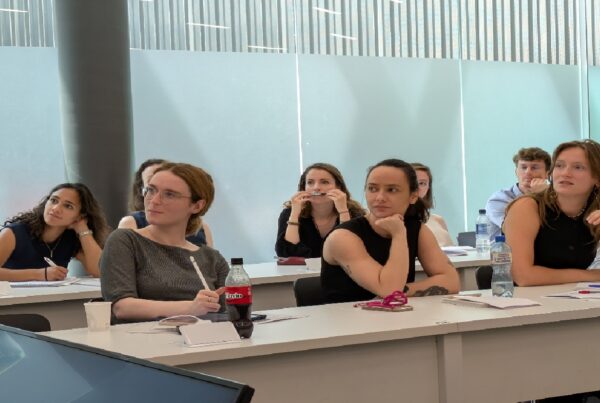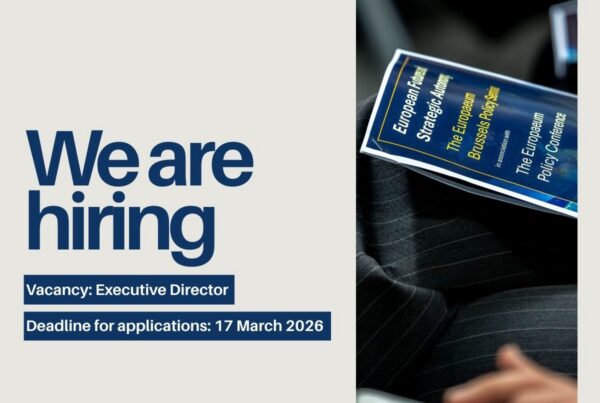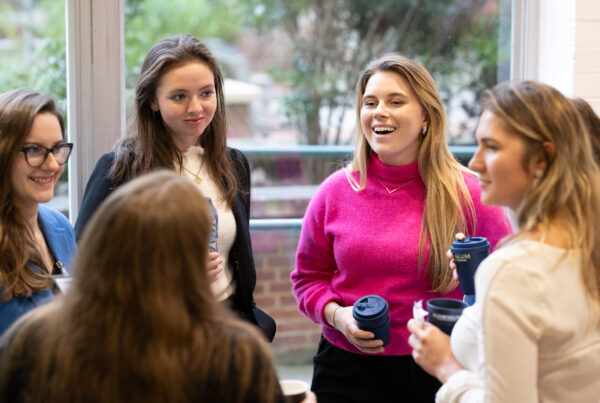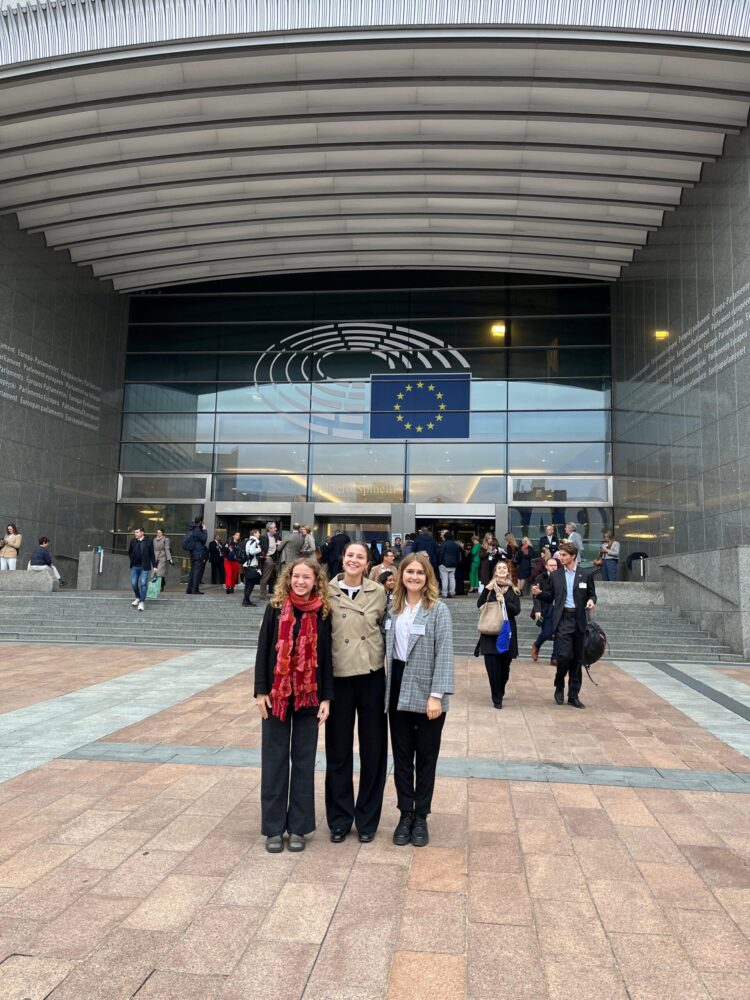
About the Author:
Hope Philpott is a second-year Master’s student of European Politics and Society, currently based at Universitat Pompeu Fabra, Barcelona. She previously studied BA History at the University of Oxford.
Image above: Hope Philpott on the right with fellow EPS students taking part in the Brussels Policy Seminar
Day 1: from class to catch-ups
I began my journey to the Europaeum policy seminar on Strategic Autonomy, appropriately enough, debating the relative power of different EU actors and institutions in class at my university, Pompeu Fabra. Having evaluated the relative merits and pitfalls of several theoretical approaches, and having chewed over bargaining satisfaction and the Commission’s love for regulation, it was time to gain insights from the metropole itself, Brussels.
Deterred by prohibitively expensive train tickets and that slight geographical obstacle, the Pyrenees, I had reluctantly resigned to flying, landing in Zaventem in time to check in to the hotel and grab an overdue drink with course friends who are interning in Brussels. It was wonderful to see them, and to be duly ridiculed for my Mediterranean wardrobe choices.
Day 2: new friends, new insights and Von der Leyen 3.0?
After a swift and pastry-heavy breakfast, we strode through the crisp streets towards Brussels Press Club for our first day of events. The first panel, on disinformation and media resilience, proved interesting, not least because Giuseppe Abbamonte of DG Connect faced the unenviable task of outlining the Commission’s media strategy alongside characteristically sharp scrutiny from journalists and academics. For Eddy Wax of Euractiv, the Commission’s Media Freedom Act is too little too late; for Babette de Naeyer, Ömer Şahin and others of the Europaeum Scholars Programme, a new ‘pay per article’ model of media consumption could provide answers to the challenge of funding quality local media outlets.
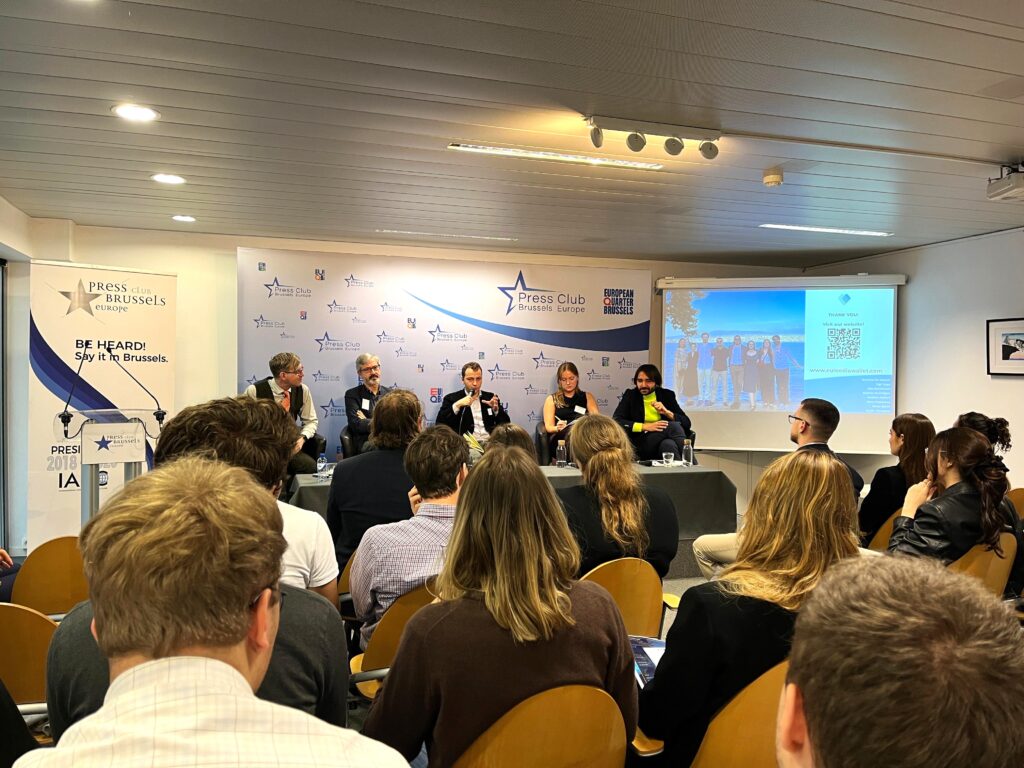
The next panel, a reflective discussion by esteemed EU diplomat and policymaker Jim Cloos, whose career has seen him contribute to the negotiations which led to the Maastricht Treaty and serve as Jacques Santer’s Sherpa for the G8, was fascinating. Cloos was unreserved in giving opinions on momentous events in European history, from the supposed ‘Euro-sclerosis’ of the 1980s to the, at times strained, interplay between EU institutions. There was even room for spitzenkandidat musings.
After lunch and making new friends – including a graduate from our programme – we attended a panel on depolarisation, which covered crucial themes from media pluralism to factionalism and, ironically enough, became a little icy. Then we headed to the beautiful Fondation Universitaire for a keynote roundtable on the second Von der Leyen Commission. The speakers, all accomplished academics and keenly experienced Brussels-observers, did not fail to provide instructional insights. I will be thinking about Prof. Andrea Renda’s notion of the Commission’s need for a near-doctrinal but ever-changing ‘north star’ – (Open) Strategic Autonomy, (Sustainable) Competitiveness, the Green Deal, the Draghi Report – for a long time. Most esoteric but entertaining were Prof. Martin Westlake’s musings on a potential third Von der Leyen Commission.
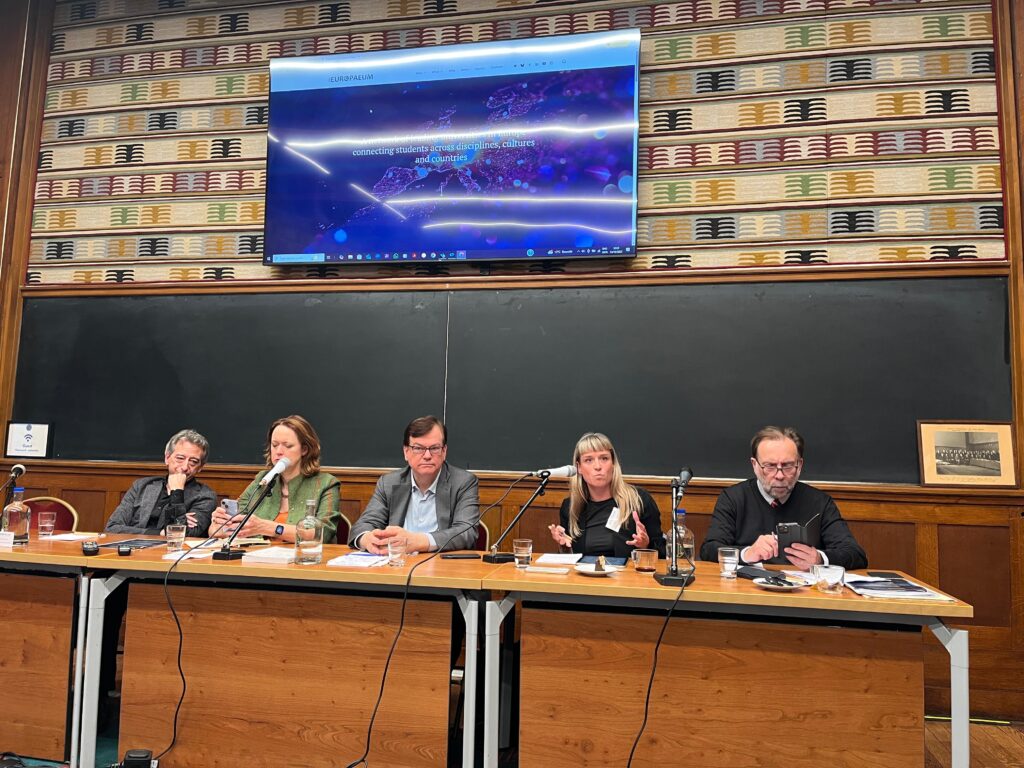
Steeped in intellectual thought for thought, it was time for dinner and debriefs on day one at L’equinoxe. After a long day, the restorative vegetable lasagne was exactly what I needed. After hearing all about my colleagues’ inspiring and international academic journeys, it was time for some well-earned sleep.
Day 3: faith in politicians and musings on history
We headed, coffee-clutching, back to the familiar Press Club for a panel on urban greening and renewal, which made a nice change from the cut and thrust of European politics. Next was a prize-giving ceremony for the winners of the Europaeum Scholars’ Project; the winning initiative seeking a more humane EU asylum system seemed timely and instructional. We were also treated to a fascinating discussion by António Leitão Amaro, Portuguese Minister for the Presidency, who took a break from politics to become a Europaeum Scholar a few years ago. He gave a frank and stimulating discussion of his Migration brief. His enthusiasm and positivity towards a deeply divisive topic was refreshing, and I left with renewed faith in (some) politicians.
Next stop was the heart of Brussels, Place de Luxembourg, for a very Brussels bubble, and tasty, EXKi lunch. Indeed, we appropriately ran into our interning friend. Then we passed through security checks to visit the Parliament, with stimulating talks from Victoria Martin de la Torre (EPRS), Philipp Schulmeister (DG Communication, EP) and Lasse Boehm (DG Economy, EP). Schulmeister’s musings on autocratisation and, conversely, communicating the overwhelming support for European integration reflected in Eurobarometer polls, were thought-provoking. Boehm’s candidness on the tensions within EU economic policy were illuminating. The cogs in my internal Strategic Autonomy confusion roadmap continued whirring.
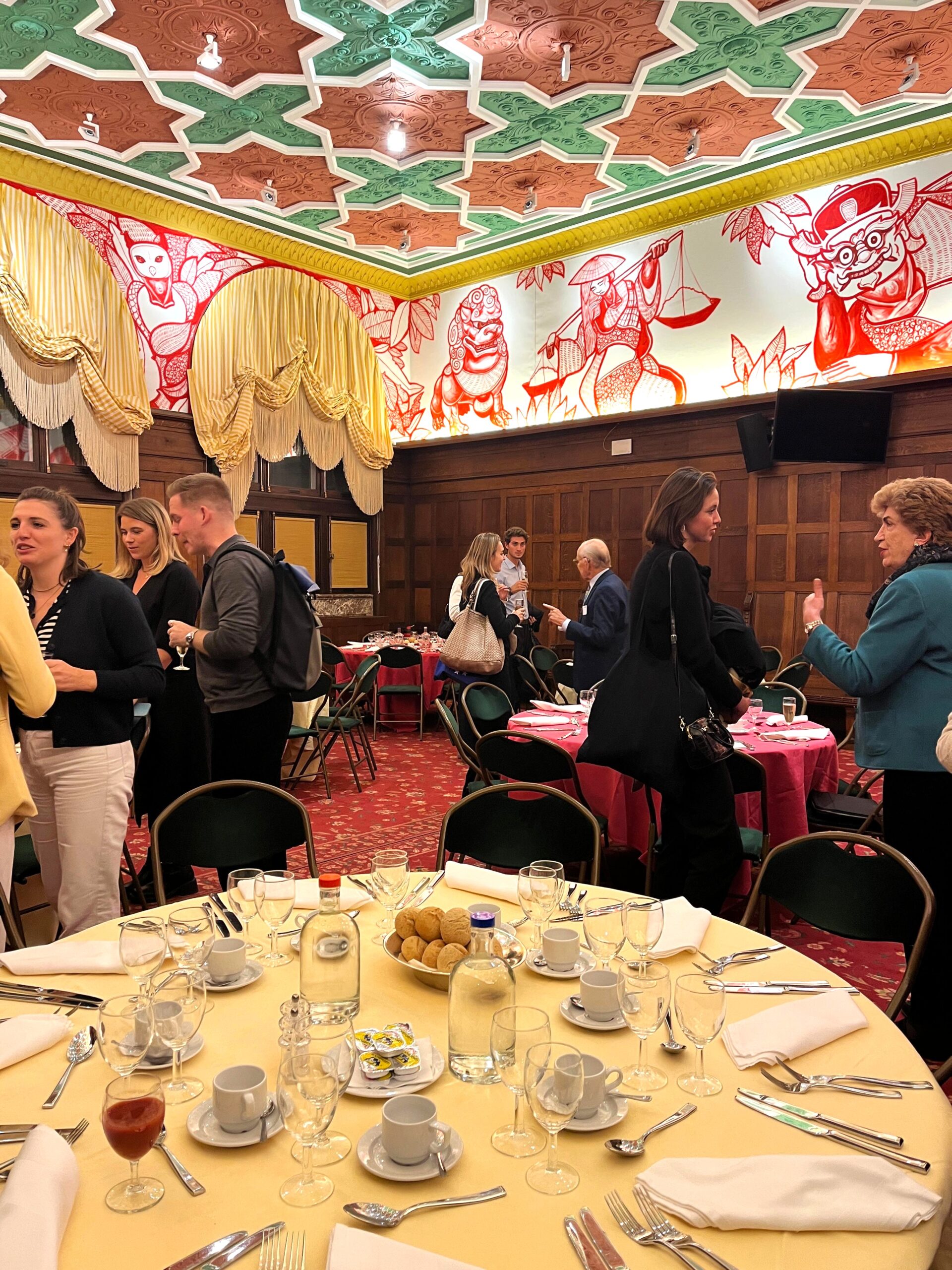 More Strategic Autonomy talk beckoned. Back at Fondation Universitaire, Claude-France Arnould and Jamie Shea delved into the defence dimensions, whilst Axel Marx mused over the ‘economic security’ instruments increasingly used by an Autonomy-seeking EU, and some alarming reasons for concern on deregulation.
More Strategic Autonomy talk beckoned. Back at Fondation Universitaire, Claude-France Arnould and Jamie Shea delved into the defence dimensions, whilst Axel Marx mused over the ‘economic security’ instruments increasingly used by an Autonomy-seeking EU, and some alarming reasons for concern on deregulation.
After these sober assessments, we perhaps epitomised European incoherence by dining and drinking in the magnificent hall. The discussions had all the atmosphere of an Oxford formal, with Andrew Graham’s stories of Isaiah Berlin to match. As a History graduate with a small fascination with the Reformation, I was thrilled to get the chance to talk sixteenth-century history with Dr Miles Pattenden. I await his upcoming book eagerly.
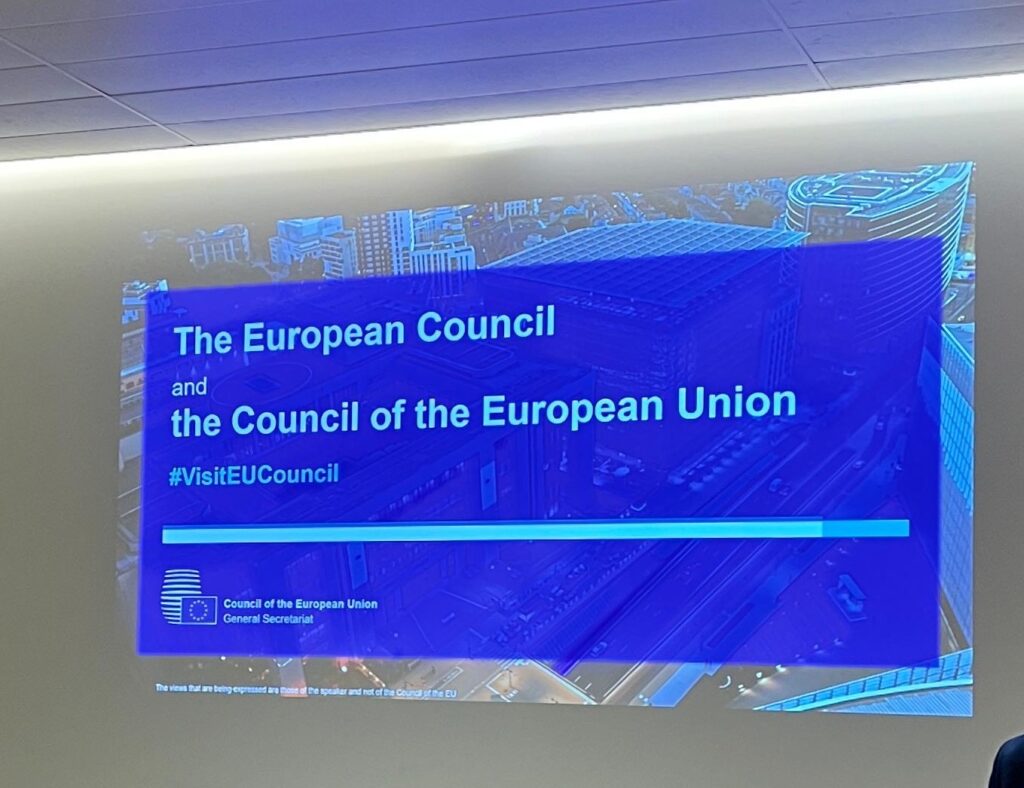 Day 4: Strategic Autonomy: towards a working definition?
Day 4: Strategic Autonomy: towards a working definition?
The final day of events started early with a visit to the Council of the EU. Our guide gave clarifying insights into the (often diverging) theories and practice of Council policymaking, which will certainly help me out in class. After a walk and coffee, we headed to Mitwit for a working lunch with Brussels-based journalists, Jennifer Rankin from The Guardian and Alice Hancock and Andy Bounds from the Financial Times. All three talked with discernment about the precarity, but relative necessity, of Strategic Autonomy (or something slightly less paradoxical) in this multipolar world. Much of this discussion stuck with me – on the EU as shaped by crises but perhaps unequipped to survive the next, on Strategic Autonomy as a Macronist legacy, on Europe’s lifestyle economy. Most importantly, we avoided discussing the EP veggie burger debate, which has certainly had enough coverage.
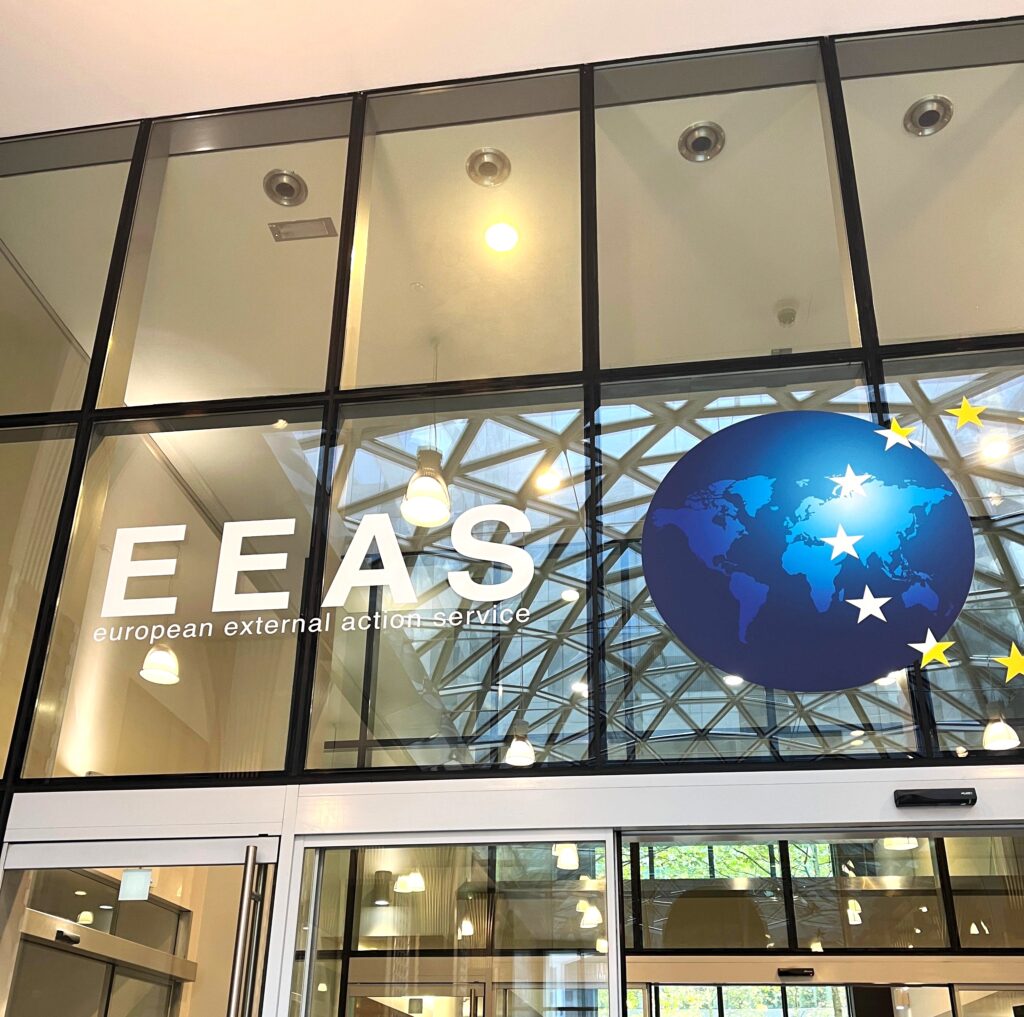 Inspired, we headed back towards EU land, to the European External Action Service (EEAS). Elisa Bellotti, Policy Officer, outlined EEAS’s work, whilst Cormac Shine, of the Security and Defence Policy Directorate, discussed the EU’s myriad of defence policies and strategies, and answered some epochal questions about history’s utility to contemporary politics and diplomacy.
Inspired, we headed back towards EU land, to the European External Action Service (EEAS). Elisa Bellotti, Policy Officer, outlined EEAS’s work, whilst Cormac Shine, of the Security and Defence Policy Directorate, discussed the EU’s myriad of defence policies and strategies, and answered some epochal questions about history’s utility to contemporary politics and diplomacy.
On this reflective note, we headed for our final group dinner at Attica. It’s a cliché, but I was amazed that we’d covered so much academic, political and personal ground in just three days, and felt truly grateful to have met so many wonderful people doing fascinating research. As we mused about our own definitions of Strategic Autonomy over delightful tirokafteri, I was struck by the brilliant minds around me. The future of EU research is in safe hands.
As a fitting sendoff to Brussels, we headed with new and old friends to Place de Luxembourg, or Plux, for its infamous Thursday night drinks, and were not disappointed. What felt like the entirety of the Schuman and Bluebook cohorts were packed into the bustling square, clad with work laptops and enthusiasm. It was entertaining to soak up this final manifestation of the Brussels bubble before heading back to the more relaxed pace of Barcelona.

